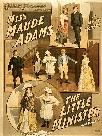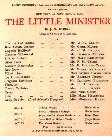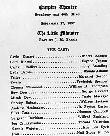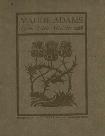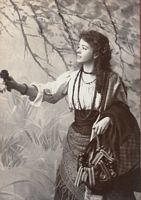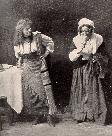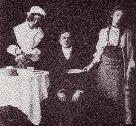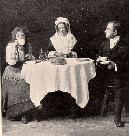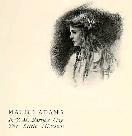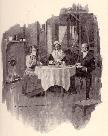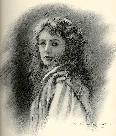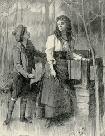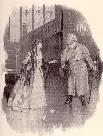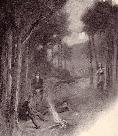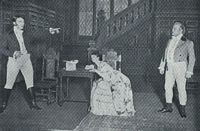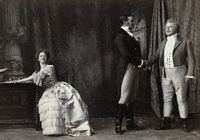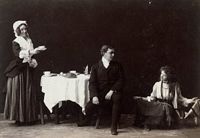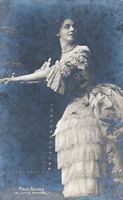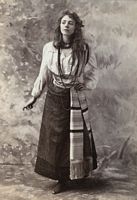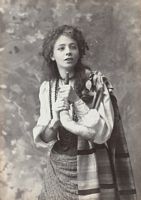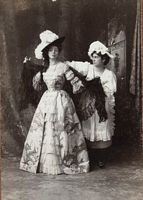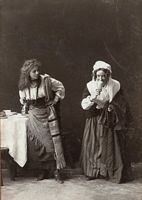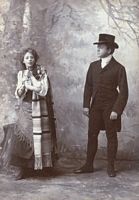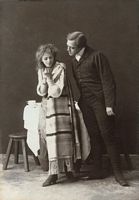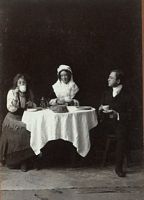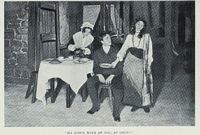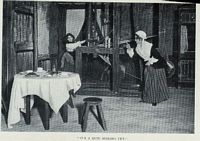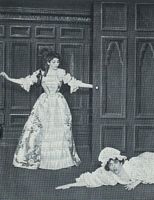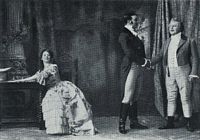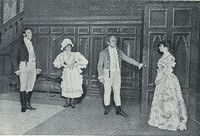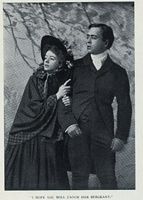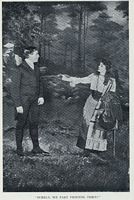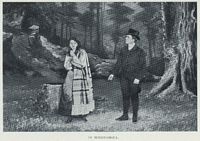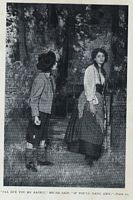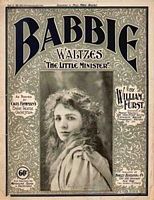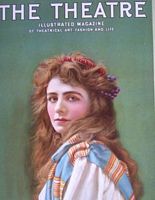
The Little Minister
The play was by J.M. Barrie. Maude Adams played Lady Babbie. It ran for over 300 consecutive performances.
Apparently Mr. Barrie came close to not even writing it. He was reluctant to go ahead with the writing since he did not have any idea who should play the character of Babbie. While in New York he saw Maude Adams playing in Rosemary and decided that she would be the person to perform the character of Babbie.
A young man falls in love with Babbie. Babbie is the daughter of Lord Rintoul and is known as Lady Barbara. one night she dresses up as a gypsy, Babbie, and leaves her castle to warn the villagers that her father is sending soldiers to have a bunch of people rounded up. The people are weavers who have been rioting against a disastrous lowering of prices for their goods.
The play opened first for a two-week trial perforamnce in the Lafayette Square Theatre in Washington, D.C., and it was not overly successful. It then opened on September 27 of 1897 at the Empire Theater. The critics conceded that Maude Adams was a good leading lady but weren't yet sure of her place among the "stars" of the theater.
The Little Minister made $500,000 for Frohman, $500,000 for Barrie, and giving Miss Adams a star status which shortly enabled her to make $500,000 a year."The Great White Way: A Re-creation of Broadway's Golden Era of Theatrical Entertainment, Allen Churchill, 1962
=====From the Acton Davies book=====
"J. M. Barrie,, author of "The -Little Minister, was on a viadams to this country that winter, and he, Miss Adams., and Mr. Frohman had many consultations with regard to the advisability of turning his novel into a play. The contract was signed, and early in the following summer the manuscript of his new play was delivered to Mr. Frohman. Both he and Miss Adams were so charmed with it that they immediately selected it to be the play in which Miss Adams should make her stellar debut. After a week of preliminary performances in Washington, Miss Adams made her first metropolitan appearance as a star at the Empire Theatre, September 28, I897-The Little Minister proved more than a success. It was a double-barreled hit, a two-ply triumph, in which Maude Adams as an artist and J. M. Barrie as a playwright shared almost equally. if Miss Adams lives to be one hundred, and if in time to come her repertory extends from Little Eva to Lady Macbeth, she will never forget the rousing New York welcome which was given her at the Empire that night. As for the star-well,, if Miss Adams had appeared in the worst play that was ever penned in the American Dramatists' Club she would have been royally welcomed. That welcome was in fact a case of "That's for remembrance." The cropper which a bad play might have brought her would have been postponed."
"But The Little Minister was not a bad play; that's the beauty of it. Technically, it defies almost every stage tradition, but when a man like Barrie handles the reins., that is more a relief than otherwise,, and there is a freshness and a wit and spontaneity to it that made it to every class of playgoers an unmitigated delight."
"Whether his work be a novel or a play, Barrie possesses the God-given knack of touching things with spirit light. This little play has a plot scarcely wider than your little finger, and yet it teems with romance, and there is more real comedy in it than has been shown in all the comic productions in a year. The most ardent admirer of the novel can not find fault with Mr. Barrie for the manner in which he has turned it into a play, nor could Mr. Frohman be criticized for the manner in which he had cast it. The plot of the play wanders far afield from the novel, but the characters are all there, Lady Babbie, Gavin Dishart, and all the prominent citizens of Thrums."
"Rarely had a star been born under more auspicious circumstances. Miss Adams threw her whole soul into her work in this role. And well she might, for Lady Babbie was a part after her own heart. She is simply a little devil who loves a joke even more than she loves her lover, but Barrie had contrived two or three serious little scenes in the midst of the fun, which shows that after all the Lady Babbie is deeper than she seems. It is a pity, though, that Mr. Barrie chose to end his play so flippantly. There is no necessity for it. After collecting all the ingredients for a charmingly sentimental ending he brings in a splash of broad comedy which almost robs the finale of its charm."
"But there is no use in analyzing The Little Minister. One likes it almost as much for its faults as for its virtues. All that it is necessary to state is that between them Maude Adams, J. M. Barrie, and Charles Frohman had formed a solid syndicate of success."
"With that performance at the Empire began one of the most remarkable successes in theatrical history. North, South, East, and West Miss Adams played Lady Babbie after she had concluded her extraordinarily successful New York run. Sunday-schools cried for her, and clergymen of all denominations flocked to see her play. The fact that in Rosemary and The Bauble Shop she had done far more artistic and difficult work than anything she did in Barrie's pretty play went for nothing. From the four corners of the United States of America the verdict of the playgoers seemed universal : there was only one thing greater than The Little Minister, and that was little Maude Adams. Children, corsets, and cigars were named after her, as a matter of fact I know a ten-year old child in Bridgeport, Connecticut, who has thirteen dolls, and every one of them bears the same identical name, Maude Adams, and how their owner ever identifies them Heaven alone knows."
=====Abby Aldrich Rockefeller by Mary Ellen Chase 1950=====
"In the autumn, although she is still entertaining his rivals in Providence, she meets him during frequent trips to New York for shopping with her mother or for the theatre; and, although he is starting eagerly in business, he finds time for delightful hours with her. They see Maude Adams in "The Little Minister"-an excitement forever memorable to those who still recall it-..."
=====The Theatre Handbook and Digest of Plays edited by Bernard Sobel, 1940)=====
"A dramatization of Barrie's novel of the same name. The title character is Gavin Dishart, twenty-one year old preacher who has established in influence in Thrums, a small weaving town in Scotland. His youth, shortness of stature and occasional gaiety encourage the village to erect a maternal sort of vigilance over him. They watch everything he does and then interfere or criticize with neighborly efficiency. The plot concerns the little minister's romance with Babbie the gypsy. From the day when she enters his life, with her gypsy dress, dancing feet, madcap tricks and dazzling eyes, Gavin is a lost man. Although he tries to resist and preaches three castigating sermons on "woman,' it is to no avail. The village is outraged by the infatuation and Babbie nobly decides to give him up. She will marry the elderly Lord Rintoul. But on the eve of her marriage she hears a false report that Gavin is dead and seeks him out in alarm. They decide on a quick marriage ceremony, but are thwarted by the arrival of Lord Rintoul and others anxious to prevent the marriage. Gavin and Babbie are separated. Gavin once more wins the affection of his people and their support, and the way is finally smoothed for his union with Babbie."
=====Barrie: The Story of J.M.B. by Denis Mackail 1941=====
"There he (Charles Frohman) sat, reading The Little Minister, and as soon as he finished it he had made up his mind. He summoned Miss Marbury. The play was all right, he said. it was fine. It had every chance of success. But unfortunately it was no use to him.
"Miss Marbury kept her head, as she always did, but naturally asked why.
"Well, said Frohman, the hero had the best part in it, and that was why. What he had been hoping for, and all he now wanted, was a play in which he could star Miss Adams. At the moment he just wasn't interested in doing anything of that sort for a young actor.
"Miss Marbury still kept her head. it was a point that she couldn't argue; but she could fence. How would it be, she asked, if the author rewrote it, altered the balance, and made the heroine the real lead? One gathers, as one eavesdrops at this curious conversation, how little either party was not thinking of the original novel. The inference is correct. They were thinking, quite justifiably, of the box-office and nothing else.
"So Frohman found the suggestion admirable, though he also expressed some doubt as to whether even Miss Marbury could bring it off. For authors, he had noticed, were strangely stubborn, and seldom more so than when attempting to dramatize their own books. Good luck, however, to Miss Marbury; though of course if she had anything else for Miss Adams, he would be only too glad to consider it."
"Yet for him (Charles Frohman) it (The Little Minister) was still the vehicle which he had chosen for making Miss Adams a star, and to the last he was cabling suggestions for changes that might remove even a lingering public doubt. Her part was getting bigger and bigger, and she was being given more and more of the other characters' lines; but he was still rather worried that she wasn't in the title-role, and but for the value of the novel would almost certainly have altered the name of the play as well.
"And in the same way it was the riotous triumph of The Little Minister that made Barrie and Miss Adams such allies. Which if either of them really felt indebted to the other will probably neve be known; for both had temperments, and both had good grounds for taking more credit than they might openly admit. Yet here, with this staggering success to set it off, was the beginning of another close friendship-and of a most profitable association, too. Miss Adams became a private heroine, and another object of sentimental devotion. It was eighteen years after that performance of Rosemary before Barrie next saw her on the stage, though in the interval she had starred for him in American over and over again. But whenever she took a holiday on this side of the Atlantic, there he was to squire her, to flatter her, to employ his old and ingenious wiles again. Very possessive, and rather mysterious about it all to others-perhaps so as to heighten the romance. Always spoke of her as Miss Adams, even to those who knew her better than himself.
"A pretty tremendous triangle-the great little Frohman, the great little Barrie, and the great little Maude Adams-as theatrical history continued to be made. But whatever came afterwards, or might have come afterwards anyhow, it was The Little Minister that prepared the ground. A play, as you may remember, that the great little Barrie had once said could never be written at all.
=====J.M. J.M.Barrie and the Theatre by H.M. Walbrook 1922=====
I will venture to say that the author of the novel "The Little Minister" never tackled a harder or a more self-torturing task than when he sat down to convert it into a three-Act comedy.
He succeeded by bravely altering his story and its characterization to meet the requirements of an art-form in which everything depends on dialogue and "situation." He had already proved that he was a born dramatist as well as a born novelist, and with as swoop of instinctive perception, he gathered from his book all the elements of Drama, and left everything else -"purple patches," and all-severely alone. He composed a delicious and genuinely romantic love-story between the young Minister, the Rev. Gavin Dishart, and the pretty "Egyptian," who was to turn out in the end no less a person than Lord Rentoul's rougish daughter, Lady Babbie; and as a background to this story he depicted the puritanism of the village of Thrums "eighty years ago," and added a picturesque conflict between a community of distressed and desperate weavers and British soldiery representing the Law. Finally he sprinkled the play with humorous touches of Scots peasant character similar to those which had proved so engaging in The Professor's Love-Story. The result of it all was that the play took the public by storm, not in London only but in America where it was simultaneously acted in New York with Miss Maude Adams in the part of Lady Babbie, and had a run of three hundred consecutive performances.
=====J.M. Barrie: The Man Behind the Image by Janet Dunbar, 1970)=====
"Frohman had put a box at their disposal at the Empire Theatre for that evening, and after resting and dining, the party went along to see the play. The piece was called Rosemary, and the role of the heroine was taken by a charming young actress called Maude Adams. The party from England admired her very much.
Barrie had brought with him to America the dramatized version of The Little Minister, though it was still unfinished. Next day, Elisabeth Marbury collected it and took it along to Charles Frohman to read.
The actual sequence of events was related by Robertson Nicoll in letters to his fiance, Catherine Pollard, whom he was to marry the following year. He told her that Frohman had put a box at their disposal on the day they arrived, and after resting, they went to the theatre, and added: "We saw Rosemary, which was well acted, especially by the heroine, one of the best young actresses I have seen for some time."
Elisabeth Marbury gives a different account in her book of reminiscences, My Crystal Ball. She says that Charles Frohman summoned her to his office after he had read the script, said he liked it, but could not use it as it was a man's play, and he was looking for a vehicle for Maude Adams. Whereupon Miss Marbury declared that she would get the author to rewrite the play and make Lady Babbie the leading part. When she tackled Barrie, he refused outright: "I pleaded, I coaxed, I argued. Barrie consented to make the necessary changes, and Frohman rejoiced at the result of my diplomacy."
An even more piquant account is given in the official biography of Charles Frohman, Charles Frohman: Manager and Man by Issac F. Marcosson and Daniel Frohman:
Under Frohman's influence he (Barrie) had begun to consider a dramatization of The Little Minister, but the real stimulus was lacking because, as he expressed it to Frohman, he did not see anyone would could play the part of Babbie. Now came one of those many unexpected moments that shape lives. On a certain day Barrie dropped into the Empire Theater (New York) to see Frohman, who was out.
Why don't you step downstairs and see Rosemary?' said Frohman's secretary.
All right," said Barrie.
So he went down into the Empire and took a seat in the last row. An hour afterward, he came rushing back to Frohman's office, found his friend in, and said to him, as excitedly as his Scottish accent would permit:
Frohman, I have found the woman to play Babbie in the Little Minister. I am going to try to dramatize it myself!'Who is it?" asked Frohman, with a twinkle in his eye, for he knew without asking.
It is that little Miss Adams who plays Rosemary.'
Fine,' said Frohman. I hope you will go ahead now and do the play.'
No decision could be made because the play was still unfinished. Barrie had been impressed by Miss Adams, but there, for the time being, the matter rested.
(later...)Charles Frohman came to London, and Barrie met him again. had been rewritten and was ready, with more emphasis on the role of Lady Babbie. Frohman liked the play, but he wasn't yet ready to produce it; Maude Adams had other commitments for the near future, and Frohman intended to wait until she could take the part.
(later...)Frohman had written to say that he was now ready to put on the play, and rehearsals were in progress in New York. He thought that Miss Adam's part was a little think and would like more added to it. He thought some of the parts were superfluous. Frohman would have liked the title changed to Lady Babbie, so as to give his young star more prominence, but he knew the author would not agree to that. Still, there was room for improvement; he sent cables with suggestions, cables that Barrie did not always answer.
The play opened in September in Washington for a tryout. Audiences and critics were puzzled at first, and then it settled down to a capacity success, playing for six months in New York, followed by tours all over the States. Maude Adams had become a star of the first magnitude. Frohman was jubilant. They had a winner.
=====James Matthew Barrie: An Appreciation by Professor James A. Roy=====
As a result of the American visit, Frohman produced in New York, in September, 1897, the first dramatized version of The Little Minister. Maude Adams, whom he also met at this time and who was the original Peter Pan in the United States, took the leading role of Babbie.
=====Barrie: The Story of a Genius by J.A. Hammerton 1929=====
As there would appear to be some reason for believing that Frohman had quietly laid his plans so that Barrie should imagine himself to be the first to discover in Maude Adams the full histrionic possibilities of his heroine (for the play The Little Minister) we can appreciate something of the exceptional qualities of generalship possessed by this Niagara of a man' whose energy was such that Barrie said they could have lit a city with it.' (referring to Charles Frohman)
The staging of The Little Minister was the true foundation of his (Barrie's) fortunes in the theatre and it fell to Frohman to present it to the American public a few weeks before any London audience had the privilege of seeing it. It was produced at the Empire Theatre, New York, on September 27th, 1897. From that memorable night we can date the friendship and artistic association of those three remarkable personalities-Maude Adams, Barrie and Frohman-whose joint influence in the Anglo-American theatre during the next score of years was to be so penetrating.
=====Charles Frohman:" Manager and Man by Issac F. Marcosson and Daniel Frohman, with an Appreciation by James M. Barrie. 1916=====
Barrie's book, "The Little Minister," had been a tremendous success and, not having acquired the formality of a copyright in America, the play pirates were busy with it. Frohman, after having seen the performance of "The Professor's Love Story," had cabled Barrie, asking him to make a play out of the charming Scotch romance. Barrie at first declined. Frohman, as usual, was insistent then followed the Scotchman's trip to America.
Under Frohman's influence he had begun to consider a dramatization of "The Little Minister," but the real stimulus was lacking because, as he expressed it to Frohman, he did not see any one who could play the part of Babbie.
Now came one of the many unexpected moments that shape lives. On a certain day Barrie dropped into the Empire Theater to see Frohman, who was out.
"Why don't you stop in down-stairs and see Rosemary'?" said Frohman's secretary.
"All right," said Barrie.
So he went down into the Empire and took a seat in the last row. An hour afterward he came rushing back to Frohman's office, found his friend in, and said to him, as excitedly as his Scotch nature would permit:
"Frohman, I have found the woman to play Babbie in The Little Minister"! I am going to try to dramatize it myself."
Who is it?" asked Frohman, with a twinkle in his eye, for he knew without asking.
"It is that little Miss Adams who plays Dorothy."
"Fine!" said Frohman. "I hope you will go ahead now and do the play."
The moment toward which Frohman had looked for years was now at hand. He might have launched Miss Adams at any time during the preceding four or five seasons. But he desired her to have a better equipment, and he wanted the American theater-going public to know the woman in whose talents he felt such an extraordinary confidence. He announced with a suddenness that was startling, but which in reality conveyed no surprise to the few people who had watched Miss Adam's career up to this time, that he was going to launch her as star.
Some of his friends, however, objected
"Why split and separate a good acting combination?" was their comment, meaning the combination of John Drew and Miss Adams. To this objection Frohman made reply:
"I'll show you the wisdom of it. I'll put them both on Broadway at the same time."
He therefore launched Miss Adams in "The Little Minister" at the Empire and booked John Drew at Wallack's in "A Marriage of Convenience." His decision was amply vindicated, for both scored successes.
Charles Frohman now proceeded to present Miss Adams with his usual lavishness. first of all he surrounded her with a superb company. It was headed by Robert Edeson, who played the title role, and included Guy Standing, George Fawcett, William H. Thompson, R. Peyton Carter, and Wilfred Buckland.
With "The Little Minister" Charles Frohman gave interesting evidence of a masterful manipulation to make circumstances meet his own desires. He realized that the masculine title of the play might possible detract from Miss Adam's prestige, so he immediately began to adapt several important scenes which might have been dominated by Gavin Dishart, the little minister, into strong scenes for his new luminary. These changes were made, of course, with Barrie's consent, and added much to the strength of the role of Lady Babbie.
To the mastery of the part of Lady Babbie Maude Adams now consecrated herself with a fidelity of purpose which was very characteristic of her. Then, as always, she asked herself the question:
"What will this character mean to the people who see it?"
In other words, here as throughout all her career, she put herself in the position of the audience. She devoted many weeks to a study of Scotch dialect. she fairly lived in a Scotch atmosphere. One of her friends of that time accused her of subsisting on a diet of Scotch broth.
As was his custom, Frohman gave the piece an out-of-town try-out. It opened on September 13, 1897, a date memorable in the Charles Frohman narrative, in the La Fayette Square Opera House in Washington. It was an intolerably hot night, and, added to the discomfort of the heat, there was considerable uncertainty about the success of the venture itself. This was not due to a lack of confidence in Miss Adams, but to the feeling that the play was excessively Scotch. A brilliant audience, including many people prominent in public life, witness the debut and seemed most friendly.
Miss Adams regarded the first night as a failure. Financially the play limped along for a week, for the gross receipts were only $3,500. Yet when the play opened in New York two weeks later it was a spectacular success from the start.
Miss Adams was irresistible as Lady Babbie. As the quaint, slyly humorous, make-believe gypsy, she found full play for all her talents, and she captured her audience almost with her first speech.
Charles Frohman sat nervously in the wings during the performance. When the curtain went down the New star said to him:
"How did it go?"
"Splendidly," was his laconic comment.
"The Little Minister" ran at the Empire for three hundred consecutive performances, two hundred and eighty-nine of which were to "standing room only." The total gross receipts for the engagement were $370,000-a record for that time.
On the last night of the run Miss Adams received the following cablegram from Barrie:
"Thank you, thank you all for your brilliant achievement. What a glory to our kirk.' Barrie. Charles Frohman:" Manager and Man by Issac F. Marcosson and Daniel Frohman, with an Appreciation by James M. Barrie. 1916.
=====Hear the Distant Applause! Six Great Ladies of the American Theatre by Marguerite Vance, 1963=====
So five years passed, and it was on an autumn evening in 1897 that James M. Barrie slipped into a seat at the Empire Theatre in New York to see the play Rosemary starring John Drew. Playing opposite Mr. Drew was someone named Maude Adams. She must be good, though Barrie, riffling through his program., or she wouldn't be playing the part. The house lights dimmed; the curtain rose. Frohman had been urging Barrie to make a play of his novel, The Little Minister,, but Barrie demurred because he could find no one suitable for the part of Babbie. Now as he watched Rosemary unfold, and found himself being enchanted whenever Maude Adams stepped on the stage, he kept saying to himself, "Behold, my Babbie."
The play was written, and on September 27, 1897, it opened at the Empire. Maude Adams was now a star. Naturally elated at her success, she nevertheless regretted having to give up her association with John Drew. His lovely young niece, Ethel Barrymore, had appeared n some of the plays, trying her wings in the theatre, and she and Maude had become friends. It was hard to break away. However, once her part in The Little Minister was perfected and she had submerged herself in the character of Babbie, her spirits began to soar and by curtain time on opening night she was ready to concede her good fortune.
Oddly enough, the first reviews of The Little Minister were mixed. One paper said: "Miss Adams will be a better Babbie in a week hence. She was clearly nervous." Another declared "Her personal charm was never more potent and she was satisfying to the most exacting taste."
Nevertheless, the play continued to run to packed houses, and at its three hundredth performance in New York, Mr. Frohman presented every woman in the audience with an American beauty rose. Two seasons, 1898-1899, were spent on tour with the play, and the thousandth performance was on Valentine's Day in 1905. In 1934, The Little Minister was broadcast over the radio.
There are many amusing stories told about the long run of the play. it chanced to be playing in New Haven on a day that Yale beat Harvard in football, and the house was filled with rollicking young men bent on making the most of the evening. Yale's school color is blue, and one of Maude's lines was; "Do you lie me in this bonnet? Perhaps the other goes better with the cloak? But blue is my color."
She was somewhat prepared for a lusty shout from the audience at the word "blue" but not for the thunderous bedlam of yelling, whistling, and stamping that broke out the moment she spoke the word. It was impossible to continue with the play until the high-spirited victors could shout no more.
=====Guide to Great Plays by Joseph T. Shipley; Public Affairs Press, 1956=====
When James Matthew Barrie ( 1860-1937), beloved Scotch writer, visited New York, Charles Frohman was seeking a play for Maude Adams. With considerable change, The Little Minister, one of Barrie's early novels of Scotch life, was dramatized, and Lady Babbie, the wild gypsy with red rowans in her hair, came to the stage of the Empire Theatre, September 27, 1897, to give Maude Adams her first starring role.
The play tells of the capture of Gavin Dishart, young Presbyterian minister in the narrow and suspicious village of Thrums, by the vivacious and wayward Babbie. Dressed as a gypsy, Babbie is in the woods to warn the striking hand loom weavers that the soldiers are coming for them; Gavin is there to see that the weavers do not resist the law. Before the soldiers, Babbie declares she is Gavin's' wife. To protect her, he remains silent, and by Scotch law they are wed. They meet again at Lord Rintoul's, where the Lord's daughter, Lady Babbie, claims Gavin, while her suitors swear Gavin is wed to a gypsy girl. The offended congregation is reconciled, and the suitors are foiled, as they learn that the gypsy girl and the Lady are one.
The New York Dramatic Mirror ( October 2, 1897) found The Little Minister "at times prosy and inactive, and it frequently verges upon incoherence. Miss Adams . . . gave life, color, and rare delicacy to the highly improbable Lady Babbie." The play was better received in London, where it opened on November 6, with Cyril Maude and Winifred Emery. The London Graphic ( November 13, 1897) praised Barrie's "removing what was merely episodic, giving to his story a compactness which it did not have before, and concentrating the interest upon its real dramatic feature, which is the development and final triumph of the love of the Little Minister for his wild and wayward temptress." Bernard Shaw, who had seen the Shakespeare play the night before, reported: "The Little Minister is a much happier play than The Tempest * . Mr. Barrie has no impulse to throw his adaptation of a popular novel at the public head with a sarcastic title ( As You Like It * ), because he has written the novel himself, and thoroughly enjoys it . . . The popular stage, which was a prison to Shakespeare's genius, is a playground to Mr. Barrie's . . . He has apparently no eye for human character; but he has a keen sense of human qualities, and he produces highly popular assortments of them." Barrie's combination of nine-tenths fun and one-tenth sentiment struck Shaw as most toothsome; he felt that The Little Minister "has every prospect of running into the next century."
It ran, in London, for over 200 performances. In the United States, Maude Adams played Lady Babbie frequently until 1916. In 1925, Ruth Chatterton revived the role, with Ralph Forbes (her husband in the play as in life) and J. M. Kerrigan. Heywood Broun commented ( March 23, 1925): "There is something of genius in writing a tale of Prince Charming and making that same prince assume the habiliments of a young Presbyterian parson." Stark Young made some reservations, finding "the mood thin though arch and the situation forced and squeezed a trifle dry for every sweet or whimsical effect possible to it. On the other hand, there are spots full of the old (sic) Barrie savor, and motivations, like that of the elders and kirk members and their devotion to the young minister, that are lovable and delightful."
The generation that remembers Maude Adams continues to love the gypsy lady; but to every generation The Little Minister brings the tender stir, the universal quickening of hopefulness and ardor, the wild rouse of woodland freedom from urban restraints, the joy of love and make-believe, of misunderstanding and making up, that curl in the heart of romance.
=====Curtain Time: The Story of the American Theater by Lloyd Morris; Random House, 1953=====
Frohman's outstanding achievement as a star-maker was the career of Miss Maude Adams, who for twenty years inspired an idolatry remarkable in the annals of the stage. In 1896, when his novel, The Little Minister , was an American best-seller, James M. Barrie made his first visit to the United States. He had earlier written a play, The Professor's Love Story , which the British star, E. S. Willard, had successfully presented in New York. On the basis of this prior success American producers, Frohman among them, were urging Barrie to dramatize The Little Minister , a venture which he declined to undertake. One day while in New York, Barrie called at Frohman's office. The producer was out, and his secretary suggested that Barrie go downstairs to the Empire Theater, where John Drew and Miss Adams were appearing in Rosemary, a sentimental comedy. Barrie attended the performance, and was sufficiently captivated by Miss Adams's acting to promise Frohman that he would try to dramatize The Little Minister. Thereafter, he never wrote another novel. Instead, at Frohman's insistence, he turned out play after play, many of them written expressly for Miss Adams. "He was very dogged," Barrie wrote of Frohman after the producer's death. "I had only one quarrel with him, but it lasted all the sixteen years I knew him. He wanted me to be a playwright and I wanted to be a novelist. All those years I fought him on that. He always won, but not because of his doggedness; only because he was so lovable that one had to do as he wanted. He also threatened, if I stopped, to re-produce the old plays and print my name in large electric letters over the theater."
After meeting a poor reception in Washington during a tryout engagement, Miss Adams brought The Little Minister to the Empire on September 30, 1897. This date was, in a sense, historic. It marked the inception of that amazing relationship between the American public and the star which, beginning as a one sided love affair, developed into a worship without precedent or subsequent parallel. Miss Adams was twenty-five, winsome rather than pretty, slight, frail and girlish. Her lilting speech and muted laughter, the delicacy of her tread, the graceful swiftness of her movement, gave her a quality that soon was described as "otherworldly." Though intensely feminine, she made a curious impression of elusiveness, as if she had an elfin strain. A decade later Barrie was to say of a play that he had written for her, "I could see her dancing through every page of my manuscript." In that play, What Every Woman Knows, he gave her lines which defined her appeal for him, and certainly for the public: "Charm is the bloom upon a woman. If you have it, you don't have to have anything else. If you haven't it, all else won't do you any good."
In The Little Minister Miss Adams had a role which blended whimsical humor, sentiment and a veiled implication of pathos. These were the attributes which, in time, came to be associated with her acting and her personality, so inseparably that critical distinction between them was seldom made. Was it Miss Adams' art which imparted life to Barrie's creations? Or was it Barrie who, through his creations, endowed Miss Adams with her characteristic palette and tonality as an artist? The public never knew and scarcely cared. But the extraordinary, perhaps unique, affinity between actress and playwright was obvious. Frohman once said that, "when one of my stars finishes with a play, that play goes permanently on the shelf, no one ever hoping to muster together an audience for it without the original actor or actress in the star part." Only two of the Barrie plays which Miss Adams acted were ever successfully revived after her retirement.
During its initial showing at the Empire, The Little Minister ran for three hundred consecutive performances, to gross receipts of $370,000, a financial record at the time. Before Miss Adams finished with the play, it had three thousand performances throughout the country, earned a half-million dollars for Barrie and more for Frohman.
=====American Theatre: A Chronicle of Comedy and Drama, 1869-1914 by Gerald Bordman; Oxford University Press, 1994=====
That runaway success was James M. Barrie's The Little Minister ( 9-27- 97), Empire). Barrie supposedly dramatized his story specifically with Maude Adams in mind, and whether or not that is true (the play was performed first in America), the play launched the radiant young actress on a career as one of America's most enchanting, beloved stars.
de Adams [ne Kiskadden] ( 1872-1953) was born in Salt Lake City and was carried on stage by her actress mother, Annie Adams. She was still a youngster when she played her first speaking roles in small California towns before moving to San Francisco. She came east in 1888, where she performed in such plays as Lord Chumley, A Midnight Bell, and All the Comforts of Home. After a time she was John Drew's leading lady until Charles Frohman elevated her to stardom. At this time stage historian Lewis Strang wrote, "In figure almost painfully slight and girlish; her face elfishly bewitching in its very plainness; her eyes large, blue and roguish; her hair ashen brown and delicately rippling; unusually gifted intellectually, and with a personality of the most persuasive magnetism, Maude Adams is to-day the most popular woman on the American stage."
=====A History of the Theatre in America from Its Beginnings to the Present Time Vol. 2 by Arthur Hornblow; J.B. Lippincott Company, 1919=====
Maude Adams had such success in this last play that Frohman decided to make her a star, and he secured for her use a dramatization by J. M. Barrie of the latter's own story, "The Little Minister." Produced September 27, 1897, with Maude Adams as Lady Babbie and Robert Edeson as Gavin Dishart, the piece ran at the Empire for 300 consecutive performances, after which Miss Adams went on tour with the piece.
=====Guide to Great Plays by Joseph T. Shipley; Public Affairs Press, 1956=====
James M. Barrie
When James Matthew Barrie ( 1860-1937), beloved Scotch writer, visited New York, Charles Frohman was seeking a play for Maude Adams. With considerable change, The Little Minister, one of Barrie's early novels of Scotch life, was dramatized, and Lady Babbie, the wild gypsy with red rowans in her hair, came to the stage of the Empire Theatre, September 27, 1897, to give Maude Adams her first starring role.
The play tells of the capture of Gavin Dishart, young Presbyterian minister in the narrow and suspicious village of Thrums, by the vivacious and wayward Babbie. Dressed as a gypsy, Babbie is in the woods to warn the striking hand loom weavers that the soldiers are coming for them; Gavin is there to see that the weavers do not resist the law. Before the soldiers, Babbie declares she is Gavin's' wife. To protect her, he remains silent, and by Scotch law they are wed. They meet again at Lord Rintoul's, where the Lord's daughter, Lady Babbie, claims Gavin, while her suitors swear Gavin is wed to a gypsy girl. The offended congregation is reconciled, and the suitors are foiled, as they learn that the gypsy girl and the Lady are one.
The New York Dramatic Mirror ( October 2, 1897) found The Little Minister "at times prosy and inactive, and it frequently verges upon incoherence. Miss Adams . . . gave life, color, and rare delicacy to the highly improbable Lady Babbie." The play was better received in London, where it opened on November 6, with Cyril Maude and Winifred Emery. The London Graphic ( November 13, 1897) praised Barrie's "removing what was merely episodic, giving to his story a compactness which it did not have before, and concentrating the interest upon its real dramatic feature, which is the development and final triumph of the love of the Little Minister for his wild and wayward temptress." Bernard Shaw, who had seen the Shakespeare play the night before, reported: "The Little Minister is a much happier play than The Tempest * . Mr. Barrie has no impulse to throw his adaptation of a popular novel at the public head with a sarcastic title ( As You Like It * ), because he has written the novel himself, and thoroughly enjoys it . . . The popular stage, which was a prison to Shakespeare's genius, is a playground to Mr. Barrie's . . . He has apparently no eye for human character; but he has a keen sense of human qualities, and he produces highly popular assortments of them." Barrie's combination of nine-tenths fun and one-tenth sentiment struck Shaw as most toothsome; he felt that The Little Minister "has every prospect of running into the next century."
It ran, in London, for over 200 performances. In the United States, Maude Adams played Lady Babbie frequently until 1916. In 1925, Ruth Chatterton revived the role, with Ralph Forbes (her husband in the play as in life) and J. M. Kerrigan. Heywood Broun commented ( March 23, 1925): "There is something of genius in writing a tale of Prince Charming and making that same prince assume the habiliments of a young Presbyterian parson." Stark Young made some reservations, finding "the mood thin though arch and the situation forced and squeezed a trifle dry for every sweet or whimsical effect possible to it. On the other hand, there are spots full of the old (sic) Barrie savor, and motivations, like that of the elders and kirk members and their devotion to the young minister, that are lovable and delightful."
The generation that remembers Maude Adams continues to love the gypsy lady; but to every generation The Little Minister brings the tender stir, the universal quickening of hopefulness and ardor, the wild rouse of woodland freedom from urban restraints, the joy of love and make-believe, of misunderstanding and making up, that curl in the heart of romance.
Reviews
The critic of the Tribune wrote:
"The fact that the play pleased the audience has nothing to do with the question, because the audience of last night obviously gathered with the determination to be pleased or to die in the attempt. Miss Adams will be a better Babbie in a week hence. She was clearly nervous. Her sudden alternations of seriousness and gaiety will gain ease and effect. That Miss Adams knows what should be done in such places no one doubts."
“The fair star was the object of many demonstrations of approval" on the first night. Dramatic Mirror, Sept. 18, 1897
“The enthusiasm over Maude Adams at the Empire last night was remarkable. It was well enough known to followers of theatricals in this city that she was a favorite actress with a winsome personality, a dainty method, a sweet manner, and considerable talent; but even the long accustomed attendant upon new ventures of the stage were not prepared for any such ovation as was given to her upon her debut as a 'star.' She was applauded upon her emergence two minutes by the watch, and that is far longer than anybody who has not timed such things would suppose. At the end of the first act, before either the new play or Miss Adam's part in it had amounted to anything in particular, the curtain had to be raised four times to answer the demand of the enthusiasts." New York Sun, Sept. 28, 1897
“Miss Adams will be a better Babbie a week hence than she was last night. She was clearly nervous, and the customary effects of nervousness, exaggeration and loss of balance, were now and then to be seen. Her sudden alterations of seriousness and gayety will gain in ease and effect. That Miss Adams knows what should be done in such places no one doubts, and when she is once saved from her friends she will do it." Tribune, Sept. 28, 1897
“Miss Adams, plainly nervous and visibly impressed by the ovation accorded her , gave life, color, and rare delicacy to the highly improbably Lady Babbie. Ever a sincere and truthful actress, she imbued the character with her own sweet, girlish charm and won the hearts and favor of her audience as she has done so often before." Dramatic Mirror, Oct. 2, 1897
“Miss Maude Adams, in the character of Babbie was, within the limits of her art, very pleasing. She has personal charm, a sense of fun, vivacity and undoubted, though limited histrionic talent. She gave Babbie a decided ingenue quality, lightness, laughter and movement. Of laughter and of movement, indeed, there was rather too much; they did not give room for the slow effect of calm humor. In Miss Adam's fun there was a little too much nervous laughter, due perhaps to the fact that the evening was an important one to her. She hardly touched upon the one or two opportunities for more serious effects...However, when all is said, she made a captivating Babbie." Commerical Advertiser, Setp. 28, 1897
“The Little Minister is still the most profitable play in this country, and the larger share of credit for this must be due to the actress who 'created' Babbie, because the play has had no such vogue in England as it has enjoyed here. The charm of Mis Adam's acting in this role is, indeed irresistible. it also defies analysis. In a merely technical sense her acting has seemed more satisfying in other roles. But in no other has she exerted so strong a spell upon the public." New York Times, Jan. 10, 1900
“Long before the curtain went up the house was sold out and several hundred persons were turned away." Sun, Dec. 27, 1904
“It is some time since Miss Adams hs played such a sympathetic and satisfying role as that of Lady Babbie in the dainty Barrie comedy...Miss Adams is the same slender, winsome, witching Babbie, and her appeal is as strong as it used to be." New York Times, Dec. 27, 1904
Famous Actresses of the Day in America, 1902: “It may have been fancy, but it seemed to me that I detected the slightest trace of inevitable boredom in Miss Adam's last performances of Lady Babbie, a little loss of spontaneity, a loss so trifling that one hardly dared to hint that it was noticeable...Do you wonder, when you consider the matter, that it should have been so? Eight hundred performances of the same role, speaking the same lines, feeling the same things, hearing the same laughter, the same applause, bowing to the same curtain calls, and trying, trying, trying to be pleased with it all! The real surprise was that Miss Adams stood it so long and remained so nearly the perfect Babbie that she was to the very end. It was not strange that one who had seen her impersonation many times should at the last have suspected a shade of artificiality. the marvel was that she was not frankly artificial, wholly mechanical."
“In her portrayal of this elfin heroine of Barrie the most striking artistic trait is her absolute simplicity of utterance. She speaks every work of her share of the text as if it was the expression of a thought which had just arisen to the surface of her mind. This ought not to be an uncommon trait on the stage, but it is really so rare in its most perfect state." New York Times, Jan. 14, 1900
There is a place online which has the entire text to The Little Minister if you wish to read it yourself. You can find the text here
 The New York Times, Oct. 10, 1897 |
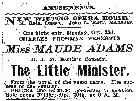 The Evening Herald, Oct. 21, 1899 |
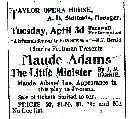 The Trenton Times, March 30, 1900 |
 Witchita Daily Times, Feb. 12, 1922 |
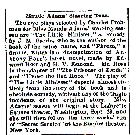 The Fort Wayne News, Aug. 16, 1897 |
 Newerk Daily Advocate, Sept. 1, 1897 |
 The New York Times, Oct. 8, 1897 (*1) |
 The New York Times, Oct. 24, 1897 |
 The Steubenville Herald, Nov. 6, 1897 (*2) |
 The Atlanta Constitution, Nov. 14, 1897 (*3) |
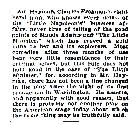 The North Adams Transcript, Nov. 7, 1898 |
 The New York Times, Nov. 12, 1898 (*4) |
 Daily Iowa State Press, Jan. 12, 1899 (*5) |
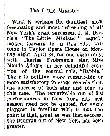 Trenton Evening Times, April 15, 1899 |
 Trenton Evening Times, April 18, 1899 |
 Trenton Evening Times, April 18, 1899 |
 The New York Times, April 23, 1899 |
 The Fort Wayne News, April 29, 1899 |
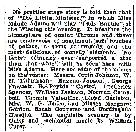 The Evening Herald, Oct. 23, 1899 |
 The Evening Herald, Oct. 24, 1899 (*6) |
 The Fort Wayne News, Dec. 30, 1899 (*7) |
 Oakland Tribune, June 11, 1904 |
 The Post Standard, Dec. 1, 1904 |
 The Lincoln Daily Star, June 18, 1916 |
|
